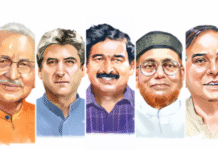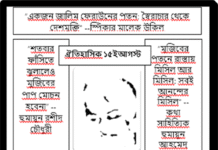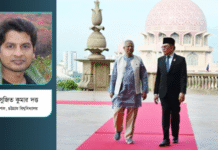The draft National Broadcast Policy 2014 as approved by the Cabinet last Monday has stirred adverse criticism in the media and political circle.
In the policy, government has embargoed running news that might damage the image of the armed forces or police or create communal strife in the draft of.
The draft policy that it has approved also states talk shows cannot air comments which are ‘confusing and not true’.
The weekly Cabinet meeting on Monday, presided by Prime Minister Sheikh Hasina, gave the go-ahead to the draft, designed to monitor and regulate the activities of television and radio stations.
“These (the sections) stipulate issues like awarding of broadcast media licences, forming of an independent broadcast commission, airing of advertisements and what cannot be broadcast and policy on other media-related issues,” Cabinet Secretary Md Musharraf Hossain Bhuiyan told reporters after the meeting.
Apart from it, the policy proscribes broadcasting programmes that may violate personal privacy and cause adverse feelings among people of different religions and social strata.
Programmes that might jeopardise state security and hurt religious sentiments and non-communal spirit cannot be aired.
The broadcast policy restricts running anything in favour of any foreign state which may hurt other foreign countries or damages Bangladesh’s bilateral ties with other friendly countries, said the secretary.
The draft bars airing scenes harmful for any particularly community or the people.
Footages and reports highlighting mutiny, anarchy, and acts of violence shall have to be presented in such a way so that they do not encourage the acts.
An Act would be framed based on this policy, under which an independent broadcast commission will be formed, added Bhuiyan.
The commission, which will also have journalists as members, will oversee the licence approvals, finalise licence fee and broadcast activities.
Journalist community raise protest
Meanwhile, the journalist community sharply reacted to the policy and burnt a copy of the policy infront of national press club terming Information Minister as the enemy of the press.
Speaking at a protest rally in front of the capital’s Jatiya Press Club, Ruhul Amin Gazi, an ex-president of the Bangladesh Federal Union of Journalists (BFUJ), said the government wanted to rule like a dictator, so it was going to control the media by imposing an undemocratic policy.
A faction of the BFUJ and another of the Dhaka Union of Journalists organised the programme and announced to hold opinion sharing meetings with media personalities, editors and other stakeholders and stage a month long demonstration to get the policy scrapped.
Describing Information Minister Hasanul Huq Inu as “an enemy of the freedom of the press”, Shaukat Mahmud, president of one BFUJ faction, demanded that the authorities bar him from visiting the Jatiya Press Club until the policy was cancelled.
A leading Dhaka daily in its editorial pointed out “ The government move to strictly monitor and regulate the media, we are afraid, will ultimately turn out to be a sword of Damocles hanging over it. We are deeply concerned about the extremely dangerous line the government is taking to muzzle the media.
BNP terms it undemocratic
The major political BNP has alleged that the new national broadcast policy is an undemocratic exercise to stifle criticism and suppress freedom of speech.
At a press conference on Tuesday BNP standing committee member Abdul Moyen Khan said, “The illegal government is taking away freedom of speech through this broadcast policy.”
“The broadcast policy that the illegal cabinet has approved is for all practical purposes a broadcast control and suppression policy,” he said.
Another standing committee member MK Anwar said the policy would be scraped if BNP comes to power.
“We will scrap that policy and restore freedom of speech,” he said.
“People have doubts about the independent broadcast commission within the framework of this so-called broadcast policy,” Moyen Khan said.
“This commission will be a government stooge. It has been given unlimited power and authority to formulate policy and control the media. This will become a dangerous weapon to turn the media into propaganda machinery for the government,” he said.
He claimed the private media would be under complete government control once this policy is is enforced.
“It is taking away the freedom of expression, news and the freedom of journalists.”
Moyen Khan also criticised the conditions placed in the policy on TV licence renewal and getting new licences.
“The policy dictates that agencies that are already broadcasting have to renew their licences. This means they won’t get their licences if they’re not subservient to the government,” he said.
The former information minister said the rule banning news which might tarnish the image of law-enforcing agencies and armed forces would encourage heinous crimes like extrajudicial murder and abduction.
“This will further endanger public safety and the various forces will lose their accountability and transparency,” he said.
Odhikar terms it draconian
Meanwhile, human rights organization Adhikar on Wednesday said that the National Broadcasting Policy 2014 would empower the government to impose ‘draconian restrictions’ on media and curb freedom of expression.
‘The government has unilaterally finalised the policy, brushing aside recommendations put forth by stakeholders,’ Odhikar said in a statement, adding that the policy would impose ‘draconian restrictions’ on broadcasting news and advertisements particularly that of political parties.
‘Odhikar believes that the policy will allow the government to interfere even more in the content of news, advertisements and talk-shows on television and radio stations,’ it said.
The cabinet on August 4 approved the broadcasting policy, keeping much scope for the government to ‘misuse’ the policy in the name of maintaining standard of news, programmes and advertisements in the electronic media.
Source: Weekly Holiday









